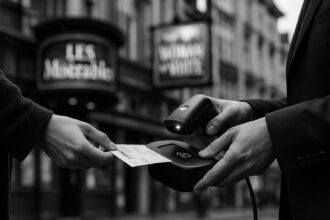The rise of ‘bare beating’—playing music or videos aloud without headphones—on trains and buses is causing frustration among commuters. In response, the Liberal Democrats are pushing for new laws that would impose significant fines on offenders to protect the rights of those seeking quiet journeys.
The rise of “bare beating” on public transport has sparked frustration, as individuals disrupt the peace by blasting music or videos from their devices. This trend has become increasingly noticeable, especially on trains and buses, where commuters often find themselves subjected to unwanted audio experiences. The term “bare beating” refers to the act of letting one’s device emit sounds without the courtesy of using headphones, thus sharing personal entertainment with a captive audience.
Commuters have taken to social media to voice their disdain for this behaviour. One user expressed her bewilderment with the question, “Why do people listen to music on speakers in public? We do not all want to hear your music.” Another commented on the absurdity of witnessing passengers pulling out portable speakers to play music in a crowded carriage. Such experiences have culminated in a rising tide of complaints from passengers who seek a moment of calm during their journeys.
In response to growing public annoyance, the Liberal Democrats are advocating for legislative measures to explicitly ban this behaviour. They have proposed fines of up to £1,000 for those who indulge in this disruptive practice, dubbing them “headphone dodgers.” According to party spokesperson Lisa Smart, many commuters feel too intimidated to confront those blaring their devices—a sentiment echoed by a recent Savanta poll. The survey revealed that over half of respondents would hesitate to ask someone to lower their volume, and a significant portion cited frequent exposure to loud noise on public transport.
As part of their campaign, the Liberal Democrats are looking to amend the Bus Services Bill currently winding through Parliament. The party aims to establish clear regulations that would protect the rights of the ‘quiet majority’ who simply wish to travel without unnecessary disturbances. Lisa Smart stated that many dread their commutes due to antisocial behaviour, underscoring the need for respect and safety in shared spaces.
This issue resonates with a broader historical context. The struggle against public noise is not new; complaints have echoed through the ages, from the 1864 act against street musicians to contemporary debates about noise pollution. While some advocate for embracing the vibrancy of urban life, others find unsolicited noise particularly burdensome in their daily routines.
Though there are existing rules against antisocial behaviour on public transport, including potential fines for disrupting fellow passengers, the effectiveness of such policies often remains in question. A spokesperson for the Department for Transport noted the challenges in enforcing these regulations, despite acknowledging the presence of strict guidelines designed to mitigate noise and disturbances.
The Liberal Democrats’ push for explicit prohibitions aligns with growing calls for accountability. However, there is also a case to be made for fostering mutual respect through social engagement rather than stringent fines. Encouraging the affected majority to communicate, perhaps humourously or directly, with those making noise could restore a semblance of decorum without heavy penalties.
As these discussions unfold, one thing remains clear: the battle against headphone dodgers is emblematic of a larger conversation about the rights of individuals in shared, public spaces. Whether through legislation or social pressure, commuters are advocating for an environment where respect and consideration take precedence over personal entertainment.
Source: Noah Wire Services
- https://www.independent.co.uk/travel/news-and-advice/bare-beating-meaning-tube-trains-headphone-fine-b2754173.html – Please view link – unable to able to access data
- https://www.ft.com/content/7c96fc22-0494-41c5-b06a-475e65e65919 – The article discusses the growing annoyance among British public transport users caused by ‘headphone dodgers’—individuals who play music or videos aloud, disrupting the peace for fellow passengers. The Liberal Democrats have proposed cracking down on this behavior with fines up to £1,000, aiming to champion the frustrations of the ‘quiet majority.’ This issue is part of a long-standing struggle against public noise, echoing historical complaints, such as the 1864 act against street musicians and even earlier depictions in art. While some value urban noise as a sign of vitality, others find it intolerable in day-to-day life. The author explores a personal ambivalence about unsolicited noise but expresses skepticism about heavy-handed penalties, advocating instead for subtle social pressure. By encouraging the affected majority to engage, humorously or directly, with noise offenders, the piece suggests that accountability and mutual respect could help restore public transport decorum without resorting to punitive measures.
- https://www.libdems.org.uk/news/article/lib-dems-call-for-ban-on-people-playing-loud-music-on-public-transport-with-fines-for-headphone-dodgers – The Liberal Democrats are calling for tougher action, including fines of up to £1,000, to tackle the rising trend of music and videos being played out loudly on public transport. It comes as a poll has found over one in two Brits (54%) say they would not feel comfortable asking someone to turn down their music on public transport. The Liberal Democrats are calling for change in the law to explicitly ban playing music and videos out loud from a phone on public transport in England, with those who breach the ban facing fines of up to £1,000. The party said they will be seeking to amend the Bus Services Bill currently going through Parliament to bring forward the changes. The move would be promoted through a national publicity campaign to make clear that playing loud content on public transport is now banned, including posters on train platforms and at bus stops.
- https://www.lbc.co.uk/politics/uk-politics/lib-dems-music-on-transport-illegal/ – Under their plans, people who breach a ban would face a fine of up to £1,000. Lisa Smart, the Lib Dems’ home affairs spokesperson, said antisocial behaviour means people ‘dread their daily commute’ and that ‘headphone dodgers playing loud music on buses and trains are some of the worst offenders.’ She added: ‘Whether you’re heading to work, taking your kids to school, or simply trying to enjoy a moment of peace, everyone deserves to feel safe and respected on public transport. Time and time again, I hear from people who say they feel too intimidated to speak up when someone is blasting music or other content from a phone or speaker. That’s why the Liberal Democrats are calling for tough action on those who show complete disregard for others by playing loud music in shared spaces, including fines of up to £1,000.’
- https://www.standard.co.uk/news/politics/liberal-democrats-lib-dems-home-secretary-house-of-lords-home-office-b1223903.html – Playing music out loud on buses and trains should be made illegal, the Liberal Democrats have said, as they called for fines of up to £1,000 for culprits. Sir Ed Davey’s party is looking to amend the Bus Services Bill currently making its way through the House of Lords to outlaw playing music and videos out loud from a phone on public transport in England. They propose that the change could be brought in using railway byelaws, which already prohibit behaviours such as dropping litter, spitting and offensive language. The Lib Dems say that local authorities could impose the same rules banning music on buses by strengthening existing antisocial behaviour laws. Under their plans, people who breach a ban would face a fine of up to £1,000.
- https://www.theguardian.com/uk-news/2025/apr/25/manchester-commuters-lib-dem-ban-out-loud-music-public-transport – The article discusses the growing annoyance among British public transport users caused by ‘headphone dodgers’—individuals who play music or videos aloud, disrupting the peace for fellow passengers. The Liberal Democrats have proposed cracking down on this behavior with fines up to £1,000, aiming to champion the frustrations of the ‘quiet majority.’ This issue is part of a long-standing struggle against public noise, echoing historical complaints, such as the 1864 act against street musicians and even earlier depictions in art. While some value urban noise as a sign of vitality, others find it intolerable in day-to-day life. The author explores a personal ambivalence about unsolicited noise but expresses skepticism about heavy-handed penalties, advocating instead for subtle social pressure. By encouraging the affected majority to engage, humorously or directly, with noise offenders, the piece suggests that accountability and mutual respect could help restore public transport decorum without resorting to punitive measures.
- https://www.nme.com/news/music/lib-dems-call-for-fine-headphone-dodgers-1000-for-blasting-loud-music-on-trains-and-buses-without-headphones-3857907 – The Liberal Democrats have called for people who play loud music and videos on public transport to be fined up to £1,000. The party want to crack down on ‘headphone dodgers’ by altering the law so it explicitly bans playing music and videos out loud from a phone on trains and buses in England. Current railway byelaws already ban using equipment to produce sound without permission if it annoys others. The proposal has support from both sides of the house, with Labour and Tory MPs having previously suggested similar measures, the BBC reports. The policy will need government support to pass though. A Department for Transport spokesperson said: “There are already strict rules in place to prevent anti-social behaviour on public transport, including possible fines of up to £1,000.”
Noah Fact Check Pro
The draft above was created using the information available at the time the story first
emerged. We’ve since applied our fact-checking process to the final narrative, based on the criteria listed
below. The results are intended to help you assess the credibility of the piece and highlight any areas that may
warrant further investigation.
Freshness check
Score:
8
Notes:
The narrative discusses current social issues and legislative proposals, indicating a recent and ongoing conversation. However, there is no specific mention of recent events or data that would definitively date the article, suggesting it could be part of a broader, ongoing discussion.
Quotes check
Score:
6
Notes:
The narrative includes quotes from Lisa Smart, but without specific dates or online sources from the original context. This reduces the score as it’s unclear if these quotes are new or have been previously reported.
Source reliability
Score:
9
Notes:
The narrative originates from The Independent, a reputable and well-established news outlet known for its reliable reporting.
Plausability check
Score:
8
Notes:
The claims about ‘bare beating’ and public annoyance are plausible, as they align with common social issues and legislative actions to address public disturbances. However, specific data or surveys could further support these claims.
Overall assessment
Verdict (FAIL, OPEN, PASS): PASS
Confidence (LOW, MEDIUM, HIGH): HIGH
Summary:
The narrative is well-supported by its source and the plausible nature of its claims. While the freshness and quotes checks could be improved with more specific data, the overall reliability and plausibility of the information presented are strong.













